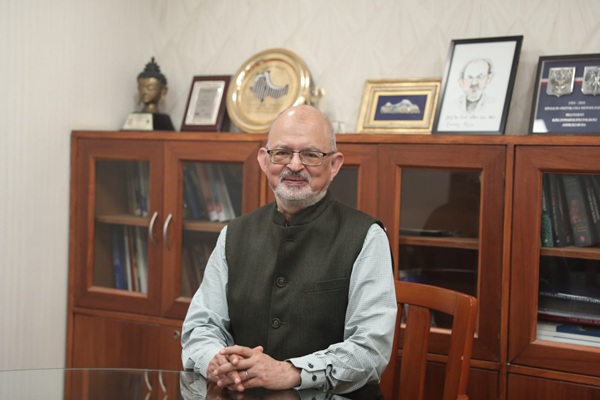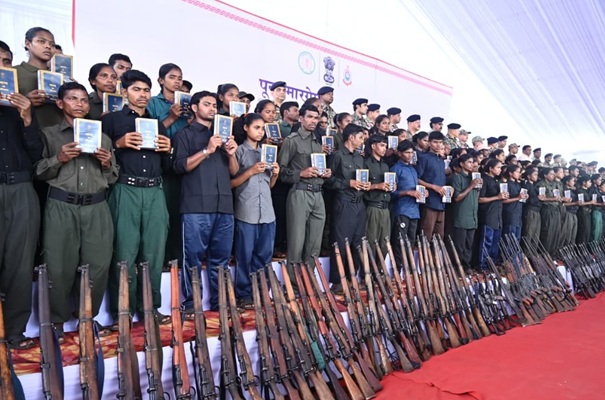.png)
ORF Chairman Joshi on How to Win in a Predatory, Bipolar World
Smaller nations must build alliances, contain the predator, and rewrite the rules of engagement, says Sunjoy Joshi.


Kirti Tarang Pande is a psychologist, researcher, and brand strategist specialising in the intersection of mental health, societal resilience, and organisational behaviour.
October 9, 2025 at 11:50 AM IST
As the world’s economic order turns inward, Sunjoy Joshi, chairman, Observer Research Foundation, warns that the new era of globalisation may look more like a hunt than a market. Joshi calls this a phase of predatory economics, where the largest economies weaponise trade, tariffs, and technology to extract, not exchange.
In conversation with Kirti Tarang Pande, Joshi says that India, and the Global South at large, must stop playing by the predator’s rules. The world is no longer a level chessboard, he says, but a Bagh-Bakri field, a survival game where smaller nations must build alliances, contain the predator, and rewrite the rules of engagement.
In this bipolar world of gated economies and collapsing systems, the challenge is not just to grow but to endure and to win on our own terms, he says.
Edited Excerpts:
Q: In which direction do you think our economic story is unfolding? Are we still on the path of high growth, or is it time to reflect on deeper structural reforms?
A: Well, we are entering a very troubled phase, and the way the situation is developing around the world, globally, countries are becoming more protectionist. When we talk today of structural adjustments or reforms, do we really know what we mean? Because the traditional thought about reform, when we started talking about reform in the 1990s, was primarily about economies opening up.
Today, the largest economies in the world are closing down. The paradox is that they are closing down while wanting the rest of the world to open up. They will impose tariffs, and we have to open up our markets to them. This is an extremely perverse, predatory world we are entering. When you enter a world of predatory economics, you must ask yourself—what is reform?
So, some people today are saying, “Oh, we need to quicken reforms.” But what do you mean by reforms? Which direction do you want those reforms to go in? Are you going to be protective? Are you going to build barriers to protect your industry? Or are you going to open up for investments?
If you are, which sectors are you going to open up for investments? Which sectors are you going to protect? There has to be very, very, very deep thinking about that. If we start talking nonsense about, “Let’s go for reform, let’s start opening up,” then we are missing the point.
So, there’s this huge conflict, this huge churn, which we need to go through in this process. These reforms—the so-called reforms, in inverted commas—are not going to be easy.
Because the direction of reform is not clear until we have a very clear strategy of where we are heading.
Q: Speaking of strategy, as a nation are we balancing too many goals—growth, welfare, self-resilience, fiscal prudence? Which ones do we often get right, and where do we stretch ourselves thin?
A: But working a nation is a complex enterprise. It is not a simple enterprise. And there are not going to be any easy solutions. So, in many cases, yes, you will find direction out of misdirection. It’s not that you won’t make mistakes — you will make mistakes. But what matters is the ability to course-correct, and to stay open to course-correction, rather than making changes on an ideological basis.
This is not a world where ideologies are going to work. To say, “Okay, we need to build this kind of nation or that kind of nation,” doesn’t help. You need to adapt to a larger environment — which has, in fact, become extremely aggressive today — and in which it’s important that, to a certain extent, you are forced to look after your own self-interest first.
You need to understand what your self-interests are. Where do you think you are headed? Do you want to imagine an India that is cohesive and integrated as a society? Or do you want an India that is polarised, broken, and fragmented? There are various kind of choices you can make in that direction.
Today, even the course of politics has become extremely fragmented. And we are seeing these movements across the world — it’s not just in India. Politics in most countries today has entered a domain that is not very safe.
I would also say that, to a certain extent, the adequacy of current systems of governance — and I’m not just talking about India, I’m talking globally — is being challenged. Take, for example, the whole idea of what the nation-state was, beginning with the Treaty of Westphalia, which became the basis for the modern world. That idea evolved through various wars and treaties into the systems of governance and the modern economy we see today.
Now, that entire foundation is being fundamentally challenged — and it’s being challenged by deep, underlying forces.
This is also questioning the adequacy and the capacity of the state to govern. We are seeing weak governance frameworks everywhere. Every nation today is complaining about corruption, irrespective of its political system. Every nation is complaining about the quality of life — people not being happy, not satisfied with their work, not content with what the future holds for them.
Whether you look at the environment, or where climate change is headed, we are entering a phase where people are genuinely afraid — and the next generation is very anxious about what the future holds.
So, in this kind of situation, I know the pathways are not going to be clear for some time. It’s going to be a huge process of churn.
Technology is making a massive difference to these changes in the world around us. And technology will remain a key driver for the years to come. Technology pulls us apart, and technology also brings us together.
Every change has a dialectic about it — meaning, there will always be opposing forces that pull you in different directions. And that is where the churn happens.
This is a huge moment of churn. And at the end of this process — I don’t know how long it’s going to last — we might find entirely new modes of how society organises itself. Either society completely collapses and refashions itself, or better sense prevails.
But for better sense to prevail, we will have to make large modifications in the way we are shaping our systems.
Q: What is your recommendation for these modifications?
A: I'm still searching, frankly.
Q: It's a diplomatic answer.
A: I’d be very happy if I could give you a blueprint or a formula for where we are and what we should be doing in this situation. But it’s very difficult to give a blueprint or a formula because, as I said, we are in uncharted territory.
The way ahead is not going to be clear for some time. It’s going to take many more people — not just me — to find the answers to where we’re headed.
Q: Well there are some people who say that we are heading towards a de-globalised world. World is no longer flat. And then, Srinath comes in and writes — No globalisation is still there. We just need to rethink it, like in a more strategic form, more regional form.
A: No, but see, that’s precisely the dialectic I’m talking about. Okay? One part of the world thinks that globalisation is dead. The problem is, if globalisation is dead, you are not going to survive within nationalistic frameworks.
Because nationalistic frameworks will eventually cause the collapse of nations.
It will cause the collapse of nations because you cannot address the issues confronting you today through that kind of nationalism. Look at the entire issue of the Global Commons. Look at what we are doing to the environment. Look at the kind of degradation we are seeing in the quality of living. Even in the most advanced countries, infrastructure is collapsing. Europe is facing it.
I keep saying that developed countries today are facing Third World problems. And they are not able to handle these Third World problems because, in the Third World, if you had these problems, then the World Bank and the IMF would come in with a huge platter of hard structural adjustments — the pain of structural adjustment.
When the same problems started occurring in the West, post the economic crisis of 2008, what did they do? They gave themselves forbearance, not structural adjustment. They just threw more money at the public. And they’ve kept throwing more money at every problem — print more money and throw it.
The consequence of that has been disastrous, and that is precisely what they are facing now. They’ve been kicking the can down the road for 25 years. And today, if the US is where it is, if Europe is where it is, it’s because they have not confronted the problems they were facing.
Now the question is — are we going to be dragged down by them? Because they are still large economies. People keep saying, “They will collapse, and we will rise.” But the problem is not that simple. In the modern system of economic growth, we’ve been trained to rise together. When the tide rises, it lifts everyone — but that model of growth is not going to work anymore.
The rising tide no longer lifts all boats. Now, we are talking about gated nations. And once you start talking about gated nations, the reverse happens — you rise only when someone else falls. You draw, you suck out, from somewhere else.
And who are you going to suck out energy and resources from? We are back to the 15th, 16th, and 17th centuries — a predatory world where everyone wants to colonise each other to gain ascendancy for their own survival. It’s an extremely dangerous world.
When you ask me, “What is the solution? How do we get out of it?” — the solution is not just about which path we should take. The real solution lies in our overall view — how we approach the problem itself.
I keep saying, time and again, that we used to think of strategy as a game of chess — where you counter your opponent’s moves. And that’s still the game the big players are playing. They’ve gone back to a board game of chess.
Russia counters China. China counters the US. The US counters China. Europe makes some moves somewhere. Smaller countries do something else. It’s a very complicated game of chess going on.
But the power balance is skewed. There are countries that hold immense power — economic power that is gargantuan. That’s the US. That’s China. The problem is, if either the US or China collapses, they take many countries down with them because so many are dependent on them for trade.
The other problem is, if either of them starts extracting resources for their own survival — parasitically exporting their problems, their inflation, their debt — which is precisely what the US is trying to do to retain its power, then they cause immense global damage again.
That’s why I keep saying: we are in a dangerous space.
I’m not worried about what the US is going to do — I’m worried about how other countries will cope. Countries that cannot play this game of chess — that cannot impose Trump-style tariffs or negotiate from a position of power — what do they do?
In Trump’s language: the ones who don’t have the cards — what do they do?
I think the game has to change. The game cannot be chess anymore. The rules have to change. The game has to change — and we have to set those rules.
Q: And what are those rules?
A: You and I come from Uttarakhand, there’s a game called Bagh Bakri?
Q: Which we play with imli seeds?
A: Yeah, the stones, imli seeds — it’s available everywhere. Anyone can play it. You don’t need a fancy checkerboard for all that, okay? The grid can be drawn on a piece of paper or even on a stone, and immediately, you can start playing it.
Now, what is that? What’s the difference between chess and Bagh Bakri?
Chess is a predatory game — but it’s ultimately played between equals. You have similar weapons; you have the king, the queen, the bishop — both sides have them. Both sides are balanced as far as power is concerned.
Bagh Bakri is not like that. Bagh Bakri is a real game of predator and prey. You have the predator and you have the prey.
One predator, five preys. In Nepal, it’s played with sometimes five to eight predators and about twenty to twenty-five prey — the board becomes larger. But whatever the variation, the principles are different.
The thing is, the prey cannot kill the predator. Unlike chess, where either side can destroy the other — chess is a zero-sum game, played to annihilate each other. In Bagh Bakri, it’s the other way around. The prey can’t kill the predator — all it can do is limit the predator’s room to manoeuvre.
You contain it. Now, how do you contain it? You make sure, by moving other bakris around. If two bakris are sitting on a point, the bagh can’t eat them. If it jumps over one, the bakri is gone. But if there are two sitting together, it can’t jump over them. That’s how the game is played — the moves are different.
So you need to build alliances. You need to build partnerships — with smaller countries, with countries that are going to be the prey — those who don’t have the cards. And then, you contain the predator’s space to manoeuvre, because ultimately, the predator needs you to survive.
If Trump’s tariffs are going to work, they’ll only work because others are going to pay for them. But if we start regional trading blocs, if we start increasing trade among ourselves, if we start building more alliances between us — then even if they want to fight a war, where will they get the cannon fodder from?
They don’t have the people. They will only fight proxy wars. Please do not enable them to fight their proxy wars on your territory. Do not become a Ukraine. Do not become a Gaza.
Now, how do we move into a world where we start building these alliances? These are the thoughts that require countries to take leadership — especially countries that see themselves on the side of the prey, rather than the predator.
And there are many of these countries — a larger number of countries are not predators. That is where the Global South comes in.
So how does the Global South react to this situation? Does it respond in a unified manner, or does the bagh succeed in dividing it, breaking it up? Because that’s exactly what the bagh wants to do.
The predator will always try to divide — that’s what they’ve done for 500 years. Since the 15th century, that’s how colonisation began.
So the tactics that the two sides are going to pursue will be very, very different. Therefore, you need to strategise and play those kinds of tactics.
The solutions to the current set of problems will be found on a very different map — on a very different kind of board.
Q: True, like my generation, we have grown up in a liberalised world, and now with these tariff walls and reciprocal trade, I don't see where that world is going.
A: Liberalism has become suspect. Okay. Liberalism has become suspect primarily because the liberal became illiberal.
Cancel culture was started by the liberals — where, in the name of being politically correct, they started blocking out certain views and not allowing them expression.
You see, we keep talking about free speech. But real free speech actually started ending with that.
And then, because the internet came, social media came, the threat — as far as liberals were concerned — became greater and greater and greater, because anyone could stand up and say anything.
So that’s what I’m saying: the capacity of current governance systems, of current ideologies, to handle the world we’ve landed ourselves in is extremely limited. They cannot really stem this tide.
And that’s where these deeper changes are going to take place — we’re seeing them unfold every day.
Nations are going in one direction, and populations are going in a completely different direction.
Look at what happened in Nepal — the leaders didn’t know what hit them. We’re seeing it in the streets of Amsterdam, we’re seeing it in Los Angeles. The United States — it’s starting to look like third-world streets.
Why is that happening? There’s a growing number of dissatisfied people.
And if we think the third world is isolated from all this — it’s not. The same kind of problems are operating here too.
So that’s where, I’m saying, our strategies have to change. Instead of playing chess, let’s start playing Bagh Bakri.
Q: That's a nice analogy. You were saying that nation going in one direction, people going in another. So speaking of this only, when we look at India, there is a visible economic momentum. But at the same time, this phrase is being used- ‘jobless growth’. And that’s what puzzles me. I don't understand what lies in the heart of it.
A: See jobless growth is an issue with not just India faces. Joblessness is an issue which many countries are facing today. And a lot has to do again with the changes which I have described, which are larger changes, which are not in the control of the people who are governing.
Q: Then who governs these changes?
Q: What would be an example of the middle path?
A: An example of the middle path is this — I speak of a dialectic, the dialectical conflict. Eventually, every dialectical conflict ends in finding the middle path.
Because no side is completely right or wrong — both sides have something correct to say. Each shapes the other. That is the beauty of dialectical thinking.
So, more of that needs to take place. And that’s why cancel culture doesn’t work — when you negate a particular point of view, you negate a line of thought. It’s not correct.
You have to find your way. You know, I keep saying — by misdirections. First, you’ll go wrong in one direction, but then you get back. You get back to the path.
Q: You'll eventually find that path.
A: No, be willing to find it. Don't, don't put blinkers on and say that, oh, where I'm going is going to be absolutely right, I'm not going to change. If you're not going to change, you're going to lose resilience.
Q: Like ‘sunk cost fallacy’ we talk about in psychology. When you invest so much on something in terms of time, money or resources; then even if that ship is sinking, you don't want to pull out because you've invested so much. It’s a cognitive bias that we all suffer from.
A: It’s also called a Concorde Fallacy. When you keep throwing money and investing in something just because you’ve already put in an initial amount — you’ve put in so much that you can’t afford to fail.
You will not let Lehman Brothers collapse — you will bail it out. And you’ll keep on bailing it out. That is precisely what they’ve been doing for the last 25 years.
It’s a lost enterprise. Because of the gargantuan debt they’ve piled up, they keep thinking they’ll somehow find a way to keep the party going. So, they move from one crisis to another, to a third, a fourth, and a fifth.
The only thing is — they want to fix those crises by dissipating them to the rest of the world. And that’s where the predator comes in.
The rest of the world now has to handle the tsunamis coming from that — and these tsunamis are not going to end soon. They’ll carry on for some time, and they might lead us into the domain of disaster.
That’s the direction they’re headed. So how do we make sure we’re not in that line of fire? How do we guard ourselves? How do we protect ourselves?
This, I think, is a phase of consolidation — consolidation of alliances, rethinking of partnerships, and the preys getting together.



